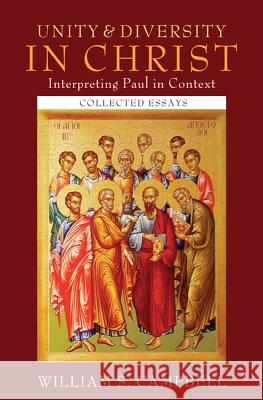Unity and Diversity in Christ: Interpreting Paul in Context: Collected Essays » książka
Unity and Diversity in Christ: Interpreting Paul in Context: Collected Essays
ISBN-13: 9781620322932 / Angielski / Miękka / 2013 / 282 str.
Unity and Diversity in Christ: Interpreting Paul in Context: Collected Essays
ISBN-13: 9781620322932 / Angielski / Miękka / 2013 / 282 str.
(netto: 124,95 VAT: 5%)
Najniższa cena z 30 dni: 132,30
ok. 16-18 dni roboczych.
Darmowa dostawa!
These essays represent William Campbells ongoing challenge over the last two decades to a residual aspect of the paradigm of Paulinism, namely that of interpreting Paul in antithesis to his Jewish roots. Campbell has proposed a new approach to Paul focusing on such themes as diversity, identity, and reconciliation as the basic components of transformation in Christ. The stance from which Paul theologizes is one that recognizes and underpins social and cultural diversity and includes the correlative demand that since difference is integral to the Christ-movement, the enmity associated with difference cannot be tolerated. Thus reconciliation emerges as a fundamental value in the Christ-movement. Such reconciliation respects and does not negate the particularities of the identity of Jews and those from the nations. This paradigm transformation implies the reevaluation of all things in Christ, whether of Jewish or Gentile origin. An underlying trajectory permeates these essays. What unites them is the emphasis on continuity between Judaism and the Christ-movement, particularly as exemplified in Pauls letter to the Romans. Such continuity is vitally important not only for understanding the past and present of Christ-followers, but even more significantly for the contemporary understanding of the identity of both Judaism and Christianity. "Bill Campbell has led the challenge to traditional approaches on a number of topics arising in Romans and throughout the Pauline corpus. Anyone interested in Pauls Jewish roots, diversity within the Christ movement, and the formation of identity in the Pauline communities will be richly rewarded for making Campbell a conversation partner. His style is clear and readable, informed by the most recent research, and always thought-provoking."--Mark D. Nanos, University of Kansas"With particular attention to Pauls letter to the Romans, Campbells work is deeply informed by modern theorists and is methodologically sophisticated. His explorations of the relationship between theology and context often lead to original insights. This is one of the best works available today on the nature of Pauls theology."--Margaret Y. MacDonald, St. Francis Xavier University"Rigorously insistent on reading Pauls letters in their historical and rhetorical contexts, yet ever aware of the consequences for us as we deal with issues of identity and diversity today, these are important essays. They show a supple mind at work and present a coherent and compelling understanding of the apostle. No reader of Paul can afford to miss them."--Neil Elliott, author of The Arrogance of Nations











